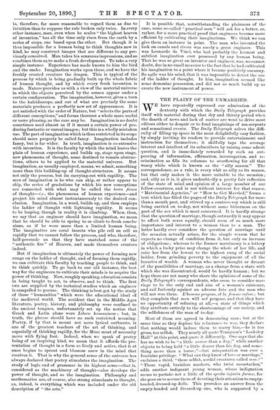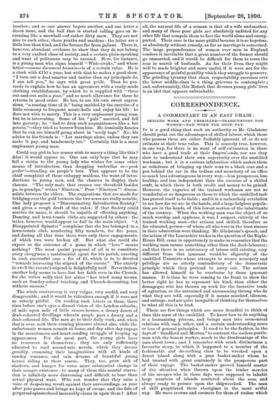THE PLAINT OF THE UNMARRIED.
WE have repeatedly expressed our admiration of the dexterity with which the Daily Telegraph provides itself with material during that dry and thirsty period when the dearth of news and lack of matter are wont to drive most editors either to despair or to fond imaginings of sea-serpents and sensational events. The Daily Telegraph solves the diffi- culty of filling up space in the most delightfully easy fashion, by simply inviting its readers to provide entertainment and instruction for themselves ; it skilfully taps the average interest and intellect of its subscribers by raising some adroit question, and is immediately rewarded by such an out- pouring of information, affirmation, interrogation, and re- crimination as fills its columns to overflowing for all that weary while which is known as the "silly season." The correspondence, as a rule, is every whit as silly as its season, but that only makes it the more suitable to the occasion ; and, silly as it is, it gives undoubtedly a pretty fair reflection of the state of mind and opinion of a large number of our fellow-creatures, and is not without interest for that reason. "Matrimonial Agencies," or "How to Get Married," forms a text which has filled the pages of the Daily Telegraph for more than a month past, and stirred up a controversy which is still being carried on to-day, not without some bitterness on the part of the sex which is most concerned. It is hardly strange that the question of marriage, though outwardly it may appear to affect both sexes equally, should seem of so much more importance and interest to a woman than to a man. The latter hardly ever considers the question of marriage until the occasion actually arises, for the simple reason that he expects no change of condition from it, but only an increase of obligations ; whereas to the former matrimony is a lottery in which a lucky prize may change the whole of her life, and raise her from the lowest to the highest rung of the social ladder, from grinding poverty to the enjoyment of all the luxuries of wealth. A woman who never thought or dreamt of the possibilities of marriage, as a change from a state with which she was discontented, would be hardly human ; but we hope there are not many who share the opinions of some of the Daily Telegraph's correspondents, who seem to consider mar- riage to be the only end and aim of a woman's existence, and rail furiously against an adverse fate and the man who will not woo them. L'homme propose, et la femme refuse ; but they complain that men will not propose, and that they have no opportunity of refusing at all,—a state of things which they attribute entirely to the shortcomings of our society, and the selfishness of the man of to-day.
Most of them are agreed in denouncing man ; but at the same time as they deplore his reluctance to woo, they declare that nothing would induce them to marry him,—he is too gross, too selfish. They nearly all quote Tennyson's " Locksley Hall" at this point, and quote it differently. One says that she has no wish to be "a little nearer than a dog ;" while another objects to being held "a little dearer than his dog, and some- thing more than a horse ;"—but misquotation was ever a feminine privilege. "What can they know of love or marriage," exclaims a third, "these selfish, sordid creatures called man ? " "These vapid, brainless mashers, who twist moustaches," adds another indignant young woman, whose indignation seems to partake not a little of the spretx injuria formw, for she goes on to accuse them of devoting their attention to empty- headed, dressed-up dolls. This provokes an answer from the empty-headed and dressed-up one, who is supported by a brother; and so one answer begets another, and one letter a dozen more, and the ball that is started rolling goes on in- creasing like a snowball—of rather dirty snow. They are not nice to each other, these youths and maidens : the latter are a little less than kind, and the former far from gallant. There is, however, abundant evidence to show that they do not belong to a very exalted class of society, and a certain plain-speaking and want of politeness may be excused. Here, for instance, is a young man who signs himself "Wide-awake," and whose letter—comme document humain—is of a certain value. He is a clerk with 2150 a year, but with that he makes a good show. "I turn out a deal smarter and tastier than my principals do, I can tell you," he says with great pride. Then he pro- ceeds to explain how he has an agreement with a ready-made clothing establishment, by which he is supplied with "three out-and-out suits a year," and so much allowance for those he returns in good order. He has, to use his own sweet expres- sions, "a roaring time of it," being enabled by the exercise of a little economy to frequent music-halls and enjoy his life : he does not wish to marry. This is a very unpleasant young man, but he is interesting. Some of his " pals " married, and fell into poverty; he "had to drop such acquaintances like a hot potato,"—they tried to borrow from him. He ironically fancies that he can see himself going about in "seedy togs." No; his advice to his friends is : "Let marriage alone, unless they can make it pay, and handsomely too." Certainly this is a most unpleasant young man.
Could any girl in her senses wish to marry a thing like this ? Alas ! it would appear so. One can only hope that he may fall a victim to the young lady who wishes for some other means of introduction than dropping umbrellas or—proh pv,dor!—treading on people's toes. That appears to be the chief complaint of these unhappy maidens, the want of intro- ductions to young men, and the chances to display their charms. "The only male that crosses our threshold besides pa, is grandpa," writes "Nineteen." Poor "Nineteen "! discon- solate between the elders. The suggestions that are made for bridging over the gulf between the two sexes are really notable. One lady proposes a "Discriminating Introduction Society," and gives a rough draft of the rules ; if that Society could survive its name, it should be capable of effecting anything. Dancing and lawn-tennis clubs are suggested by others : the latter, however, would appear to fail in the main object. "A Disappointed Spinster" complains that she has belonged to a lawn-tennis club, numbering fifty members, for five years, and during all that time there were only three engagements, of which two were broken off. But what else could she expect as the outcome of a game in which " love " means nothing ? The most quaint proposal of all is to constitute every clergyman a matrimonial agent for his parish, exacting in each successful case a fee of 25, which is to be devoted "towards increasing the stipend of the curate." The anxiety to swell the curate's stipend is delightfully =If. Nevertheless, another lady seems to have lost her faith even in the Church, for she writes sadly that her sister "has tried many means, such as Sunday-school teaching and Church-decorating, but without success."
The whole controversy is very vulgar, very sordid, and very disagreeable; and it would be ridiculous enough if it were not so utterly pitiful. On reading such letters as these, there rises before one's eyes a dismal vision of the London suburbs ; of mile upon mile of little stucco-houses, a dreary desert of drab-coloured dwellings wherein people pass a dreary and a drab-coloured life. The men go to their daily work, and, when that is over, seek their evening pleasure abroad also, while the unfortunate women remain at home, and day after day engage in the monotonous and heart-rending struggle of keeping up appearances. For the most part, the young girls have no resources in themselves ; they are only sufficiently educated to read second-rate novels, which they devour greedily, cramming their imaginations with all kinds of tawdry romance, and vain dreams of beautiful young heroes riding to their rescue. They, too, grow sick of shadows, and hunger for some more substantial change in their meagre existence : to many of them this mental starva- tion is infinitely more distressing and difficult to bear than actual physical want. Who can wonder that they raise a voice of despairing revolt against their surroundings, as year after year passes and brings no hope of escape, and the fate of perpetual spinsterhood inexorably closes in upon them ? After all, the natural life of a woman is that of a wife and mother, and many of these poor girls are absolutely unfitted for any other life that compels them to face the world alone and unsup- ported. Their case is the more pitiful because it is so hopeless, so absolutely without remedy, as far as marriage is concerned. The large preponderance of women over men in England renders it inevitable that a great number of the former should go unmarried, and it would be difficult for them to cross the seas in search of husbands. As for their" lives, they might well be made brighter and more useful, if it were not for the appearance of painful gentility which they struggle to preserve. The grinding tyranny that sham respectability exercises over the lower middle-class is a thing grievous to contemplate ; and, unfortunately, this Moloch that devours young girls' lives is an idol that appears unbreakable.



































 Previous page
Previous page